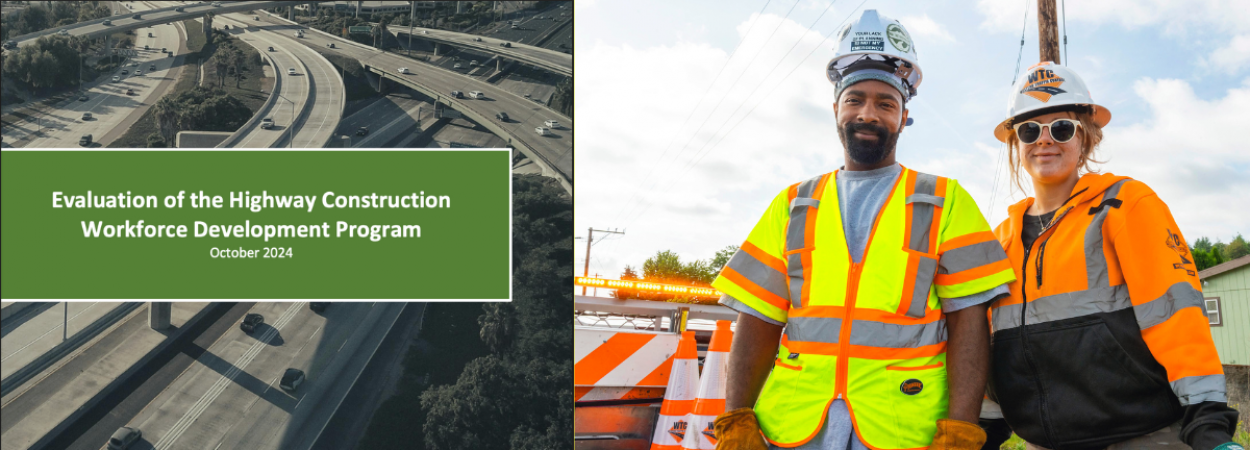A strong, diverse workforce is key to attracting and keeping the talent needed for Oregon’s expanding infrastructure projects. A new report from Portland State University (PSU) reveals significant strides in diversifying Oregon's construction workforce and improving apprenticeship completion rates.
Led by sociology professors Maura Kelly and Lindsey Wilkinson, and funded by the Oregon Department of Transportation (ODOT) and the Oregon Bureau of Labor and Industries (BOLI), the study highlights how targeted services and pre-apprenticeship programs are helping recruit, train, and retain a workforce that reflects Oregon’s communities.
The report, "Evaluation of the Highway Construction Workforce Development Program (PDF)," offers practical recommendations for building a more inclusive and resilient workforce.
A More Diverse Workforce Taking Shape
Oregon’s highway construction workforce is becoming more diverse, with more women and people of color entering apprenticeships. In 2022-23, white men made up 46% of new apprentices—20 percentage points lower than in 2010-11. Over the same period, the share of women and people of color completing apprenticeships rose from 27% to 45%.
A key driver of this diversity, particularly for women, has been pre-apprenticeship programs funded through the Highway Construction Workforce Development Program. In 2022-23, 10% of white women and 18% of women of color apprentices had completed one of these programs before starting their apprenticeships. Because pre-apprenticeship participants often face extra challenges, the report recommends expanding “wrap-around” support—such as counseling, financial help, and hardship funds—to increase their chances of success.
Support Services Prove Pivotal for Completion
The evaluation shows that support services offered through the Highway Construction Workforce Development Program make a real difference in helping apprentices finish their training. On average, apprentices in eligible trades who received services were 10% more likely to complete their programs than those who didn’t—even after accounting for factors like race, gender, age, trade, and union status.
Completion rates improved the most when apprentices received both financial and non-financial support. This “coordinated services” approach helps them overcome a range of personal and professional challenges, making it easier to stay on track and succeed.
Targeted Takeaways for Practice
The report offers clear directives on which services are most impactful and how to optimize investments:
- Ready Items: Providing work clothes, tools, and protective equipment (PPE) has a strong positive impact, making apprentices 7% more likely to complete. This "low dollar amount investment" addresses immediate needs and connects apprentices to ongoing program support.
- Child Care Support: This service has a strong positive impact on completion. The most recent iteration of child care support (Phase 3, implemented August 2022), which bases allocation on household income and eliminated maximum benefit limits, has shown remarkable success in supporting apprentices to finish their apprenticeships.
- Hardship Funds: These funds increase completion rates by 6% for those receiving them. They address a wide variety of destabilizing situations, with housing-related support being the most common, alongside vehicle repairs and medical bills. Illness or accidents, including COVID, were frequent reasons for requesting aid..
- Non-Financial Support: Services like counseling and budget classes make apprentices 9% more likely to complete.
- Gas and Travel Funds: In contrast to other services, those receiving gas or travel funds were actually 4% less likely to complete, and previous evaluations also showed no positive impact. The researchers recommend reallocating these funds to more effective supportive services.
Looking Ahead
This study confirms that strategic investments in supportive services and pre-apprenticeship programs are vital for fostering a diverse and skilled highway construction workforce. The report calls for continued and expanded efforts, especially leveraging the proven success of enhanced child care support and coordinated services. By addressing both recruitment and retention challenges with tailored, effective interventions, Oregon can ensure a strong pipeline of talent to meet the growing demands of its infrastructure projects.
Portland State University's Transportation Research and Education Center (TREC) is a multidisciplinary hub for all things transportation. We are home to the Initiative for Bicycle and Pedestrian Innovation (IBPI), the data programs PORTAL and BikePed Portal, the Better Block PSU program, and PSU's membership in PacTrans, the Pacific Northwest Transportation Consortium. Our continuing goal is to produce impactful research and tools for transportation decision makers, expand the diversity and capacity of the workforce, and engage students and professionals through education, seminars, and participation in research. To get updates about what's happening at TREC, sign up for our monthly newsletter or follow us on social media.




